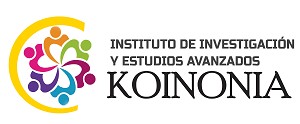La formación de microempresas, para la promoviendo de la cultura empresarial
Resumen
El comercio informal y la creación de microempresas en el cantón Ambato es fundamental para la reactivación económica, se desarrolla con muchas dificultades en todo el cantón y es una de las actividades que ha existido durante muchos años, las ventas de productos de primera necesidad, bisutería, artesanías, todo a precios cómodos y accesibles para las personas que lo adquieren al instante en los diferentes lugares de la ciudad .Se realizó la encuesta a la población económicamente activa de la ciudad de Ambato, encontrando que la mayoría no poseían permisos para laborar, no contaban con afiliación al seguro, y no tenían un trabajo estable, como propuesta se trata de organizar pequeños grupos con afinidades de trabajo para la formación de microempresas, otorgar varias capacitaciones y estrategias promoviendo la cultura empresarial.
Descargas
Citas
Condori, P. (2018). factores asociados al comercio informal en el mercado Ràez Patiño de Huancayo [factors associated with informal commerce in the Ràez Patiño market of Huancayo]. Socialium, 4(1), 58-49.
Cuadrado, M. (2017). La universidad, los programas de capacitación y las asociaciones del comercio informal [University, training programs and informal trade associations]. Mundo de la Investigacòn y Conocimiento, 1(5), 254-270.
de Souza, M. V. (2020). Concepción: El trabajador del comercio informal de calle. La producción efímera del espacio en la crisis social [Concepción: The informal street trade worker. The ephemeral production of space in the social crisis]. ARQUITECTURAS DEL SUR, 38(57), 146–161. https://doi.org/10.22320/07196466.2020.38.057.08
Ferrante, A. (2018). La importancia de la empresa familiar y la insuficiente regulación urvana de la microempresa familiar [The importance of the family business and the insufficient regulation of family microenterprises in the United States]. Revista de derecho, 86(244), 215-245.
Gamboa, C. N. (2016). Comercio informal: un estudio en el municipio de Píllaro provincia de Tungurahua [Informal commerce: a study in the municipality of Píllaro, province of Tungurahua]. Ojeando la Agenda (44), 1-19.
Garzòn, Y. (2019). Comercio informal en el espacio publico del barrio San Isidro en Villavicencio [Informal commerce in the public space of San Isidro neighborhood in Villavicencio]. GEON, 6(1), 2-19.
Jiménez-Palacios, R. (2019). Comercio informal en ciudades de frontera. Estudio de caso de los feriantes de ropa y calzado en la ciudad de Tacna (Perú) [Informal trade in border cities. A case study of clothing and footwear vendors in the city of Tacna (Peru)]. Si Somos Americanos, 19(1), 13-42. https://dx.doi.org/10.4067/S0719-09482019000100013
Jurado-Pruna, F., Escobar Redín, E., & Carrión Jumbo, J. (2021). La seguridad de la información de las microempresas en el Ecuador [Information security for micro-enterprises in Ecuador]. REVISTA CIENTÍFICA ECOCIENCIA, 8, 48–64. https://doi.org/10.21855/ecociencia.80.600Raudales, &. A. (2017). Impacto del comercio informal en la estructura económica de Honduras [Impact of informal commerce on the economic structure of Honduras]. Economìa y Administraciòn, 8(2), 215-245.
Santamarìa, T. G. (2018). El comercio informal como factor predominante en la economía local. UDAAKADEM (2), 8-21.
Serrano, G. (2018). Micro-emprendimientos informales dirigidos por mujeres después del terremoto del 16-A en la zona norte de Manabí, Ecuador. Revista de la Facultad de Agronomìa de la Universidad de Zulia, 35(3), 1-22.
Solòrzano, K. (2018). La economía informal,en zona de influencia con financiamiento micro empresarial,caso de estudi , el Carmen. Universidad y Sociedad, 10(5), 243-247.
Sumba, &. S. (2018). Las microempresas y la necesidad del fortalecimiento:Reflecciones de la zona sur de Manabi. Universidad y Sociedad, 10(5), 223-326.
Sumba-Bustamante, R, & Santistevan-Villacreses, K. (2018). Las microempresas y la necesidad de fortalecimiento: reflexiones de la zona sur de Manabí, Ecuador [Microenterprises and the need for strengthening: reflections from the southern zone of Manabí, Ecuador]. Revista Universidad y Sociedad, 10(5), 323-326.
Teneda, S. G. (2018). El comercio informal como factor predominante en la economìa local. UDAKAADEM, 2(1), 8-21.
Teneda-Llerena, W. F., Santamaría-Freire, E., & Guamán-Guevara, M. D. (2018). El comercio informal como factor predominante en la economía local [Informal commerce as a predominant factor in the local economy]. UDA AKADEM, (2), 8–21. https://doi.org/10.33324/udaakadem.vi2.172
Vallejo, S. (2018). Causas de la economía informal en el cantón Riobamba. Kne engineering, 5(2), 1-22.
Vera, B. D. (2020). Incidencia de los costes de transacciones en el dimencionamiento de las microempresas. COMPAS, 1(1), 1-65 .
Derechos de autor 2022 Wimper Olmedo Quintiguiña-Camana, Ariel José Romero-Fernández, Ramiro Felipe Guevara-Murgueytio

Esta obra está bajo licencia internacional Creative Commons Reconocimiento-NoComercial-CompartirIgual 4.0.
CC BY-NC-SA : Esta licencia permite a los reutilizadores distribuir, remezclar, adaptar y construir sobre el material en cualquier medio o formato solo con fines no comerciales, y solo siempre y cuando se dé la atribución al creador. Si remezcla, adapta o construye sobre el material, debe licenciar el material modificado bajo términos idénticos.
OAI-PMH URL: https://cienciamatriarevista.org.ve/index.php/cm/oai














